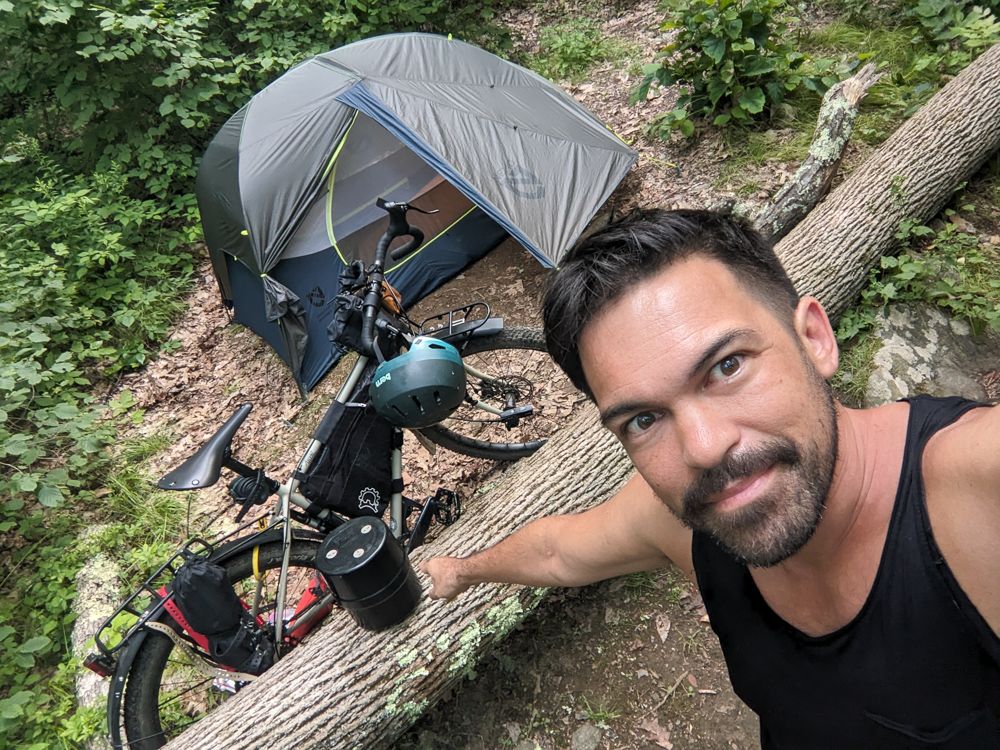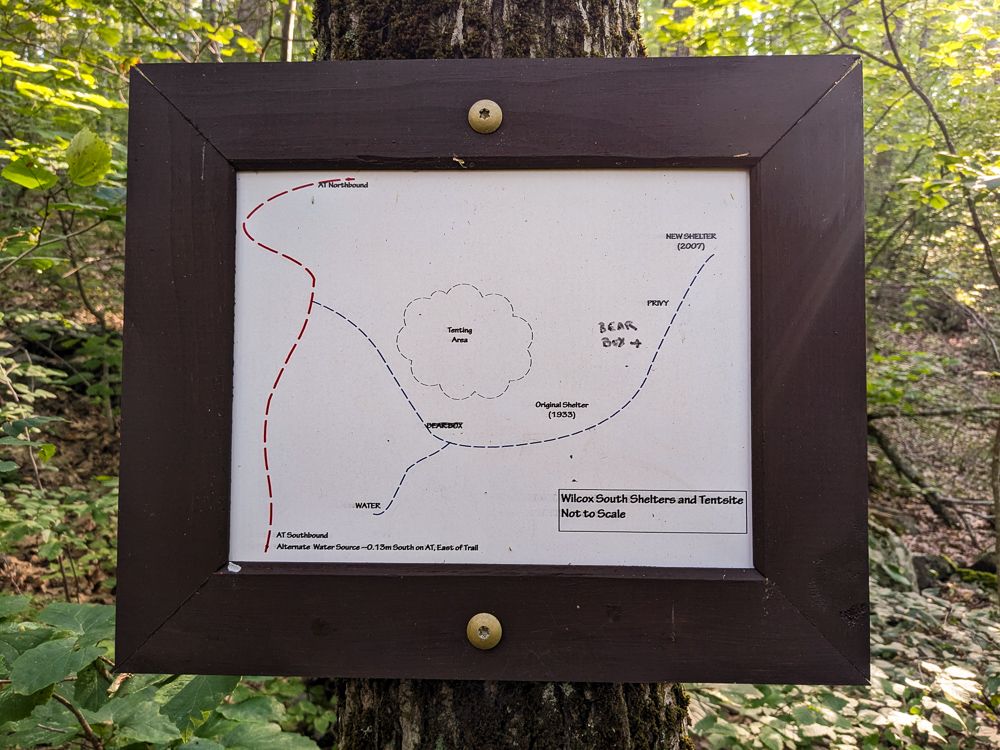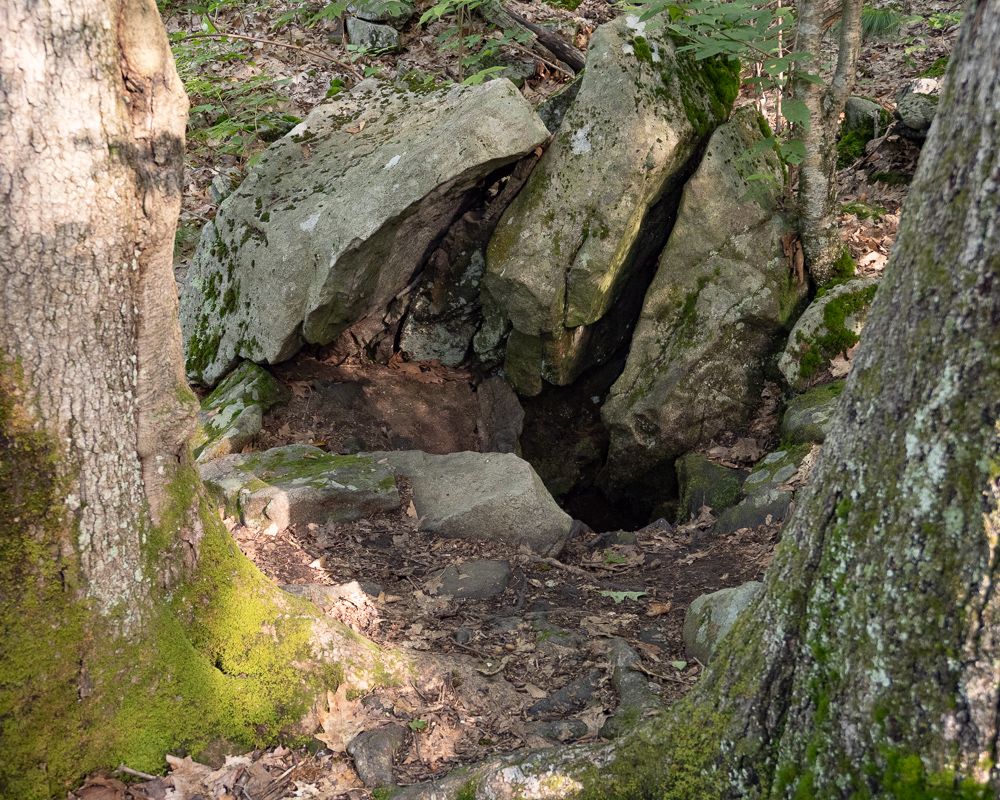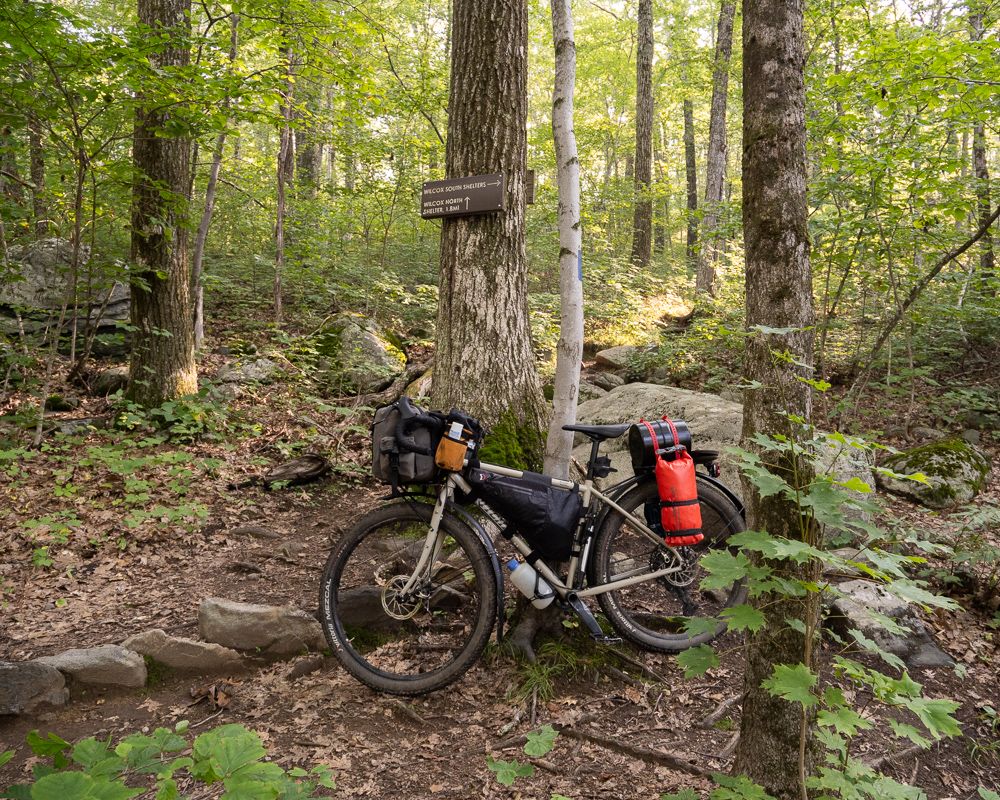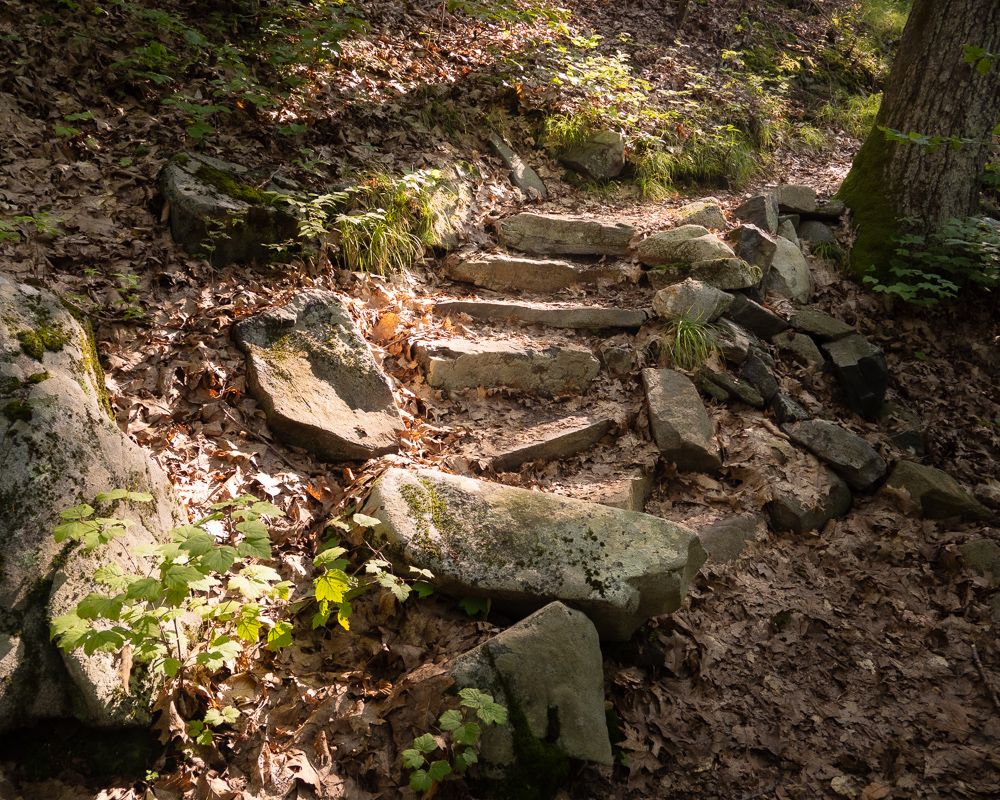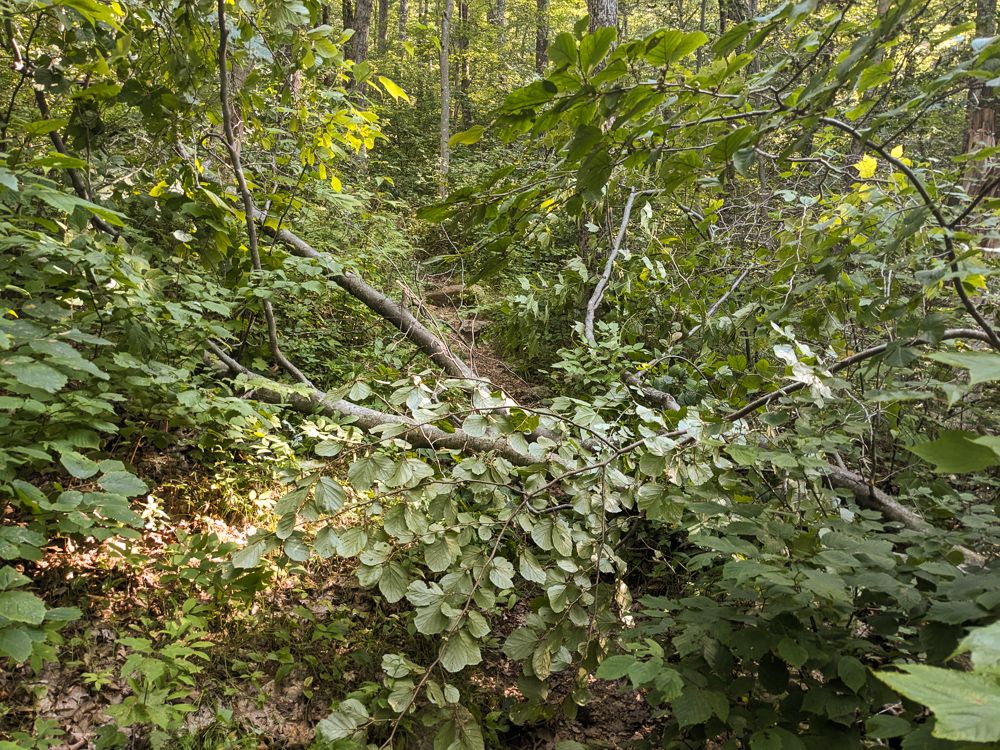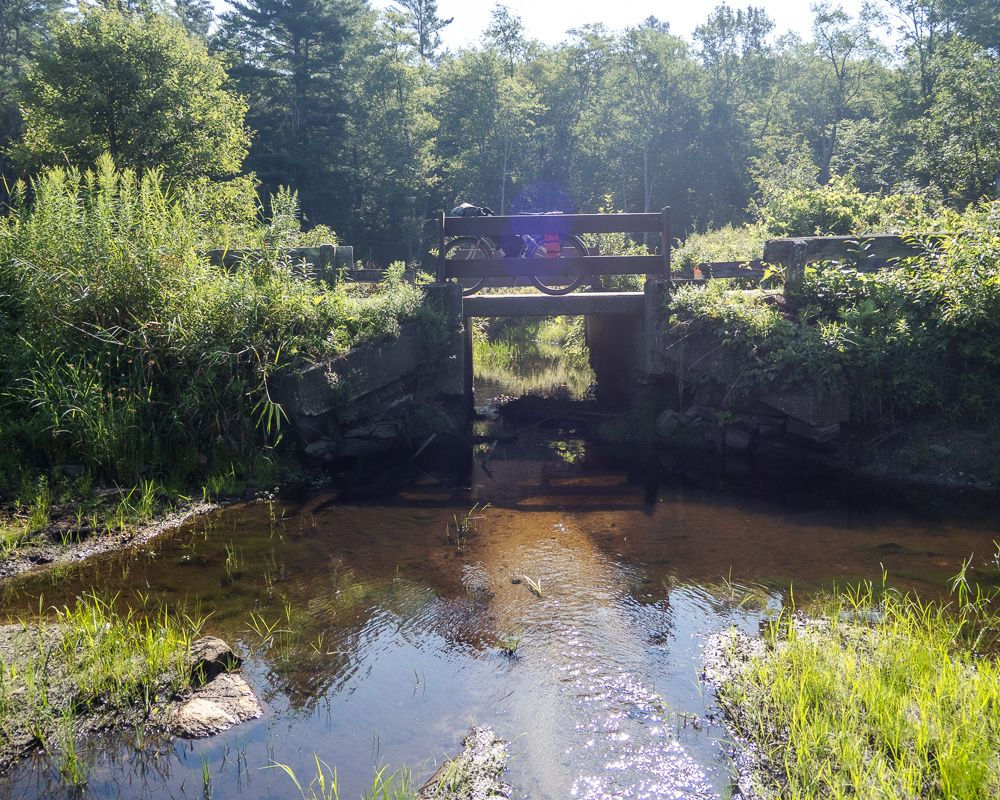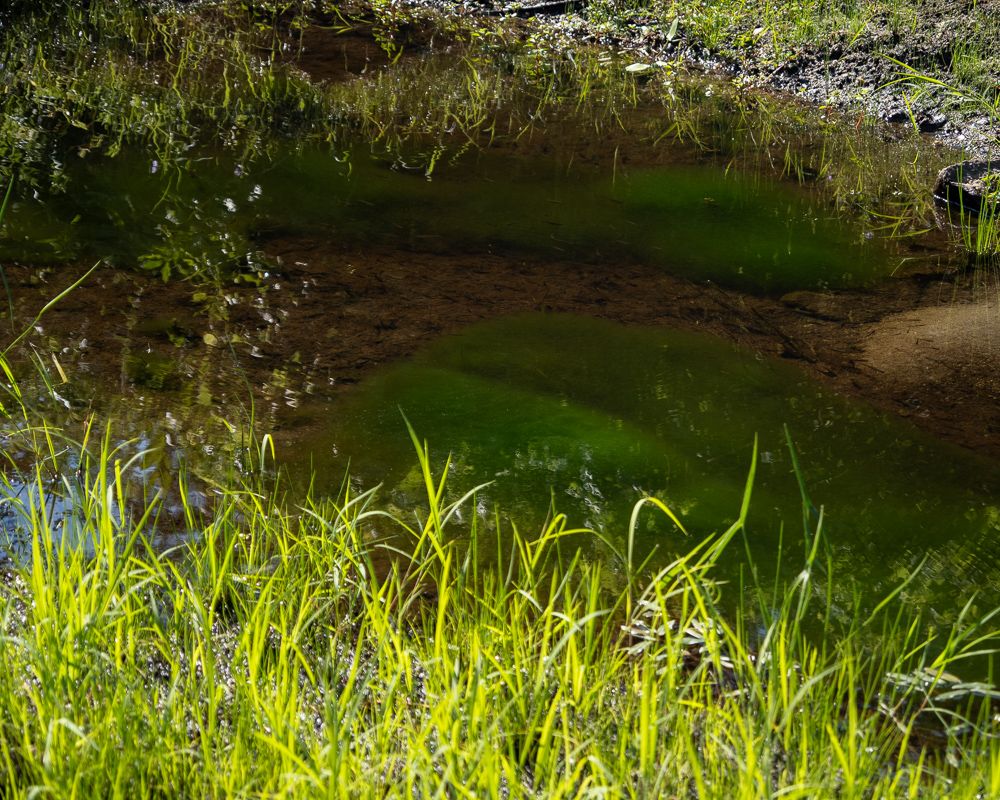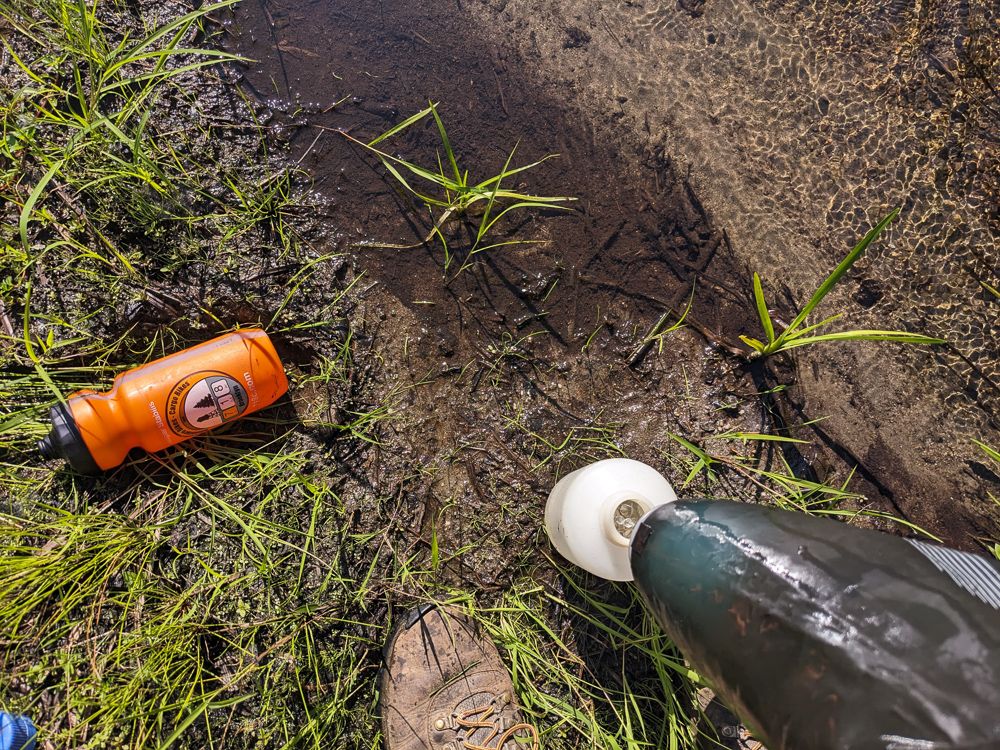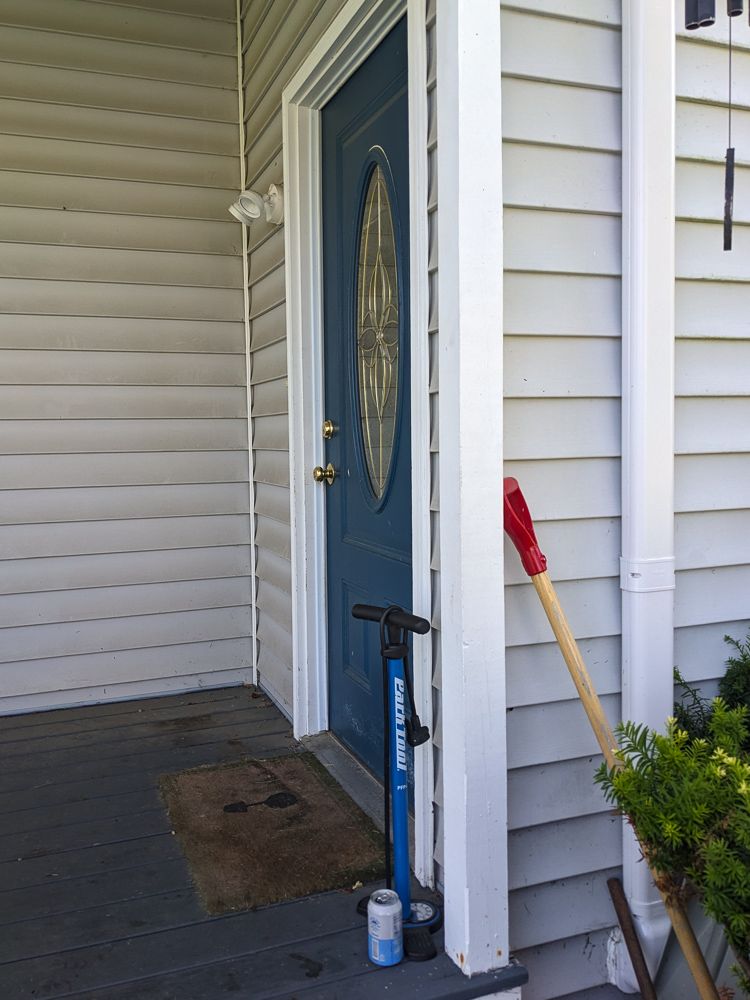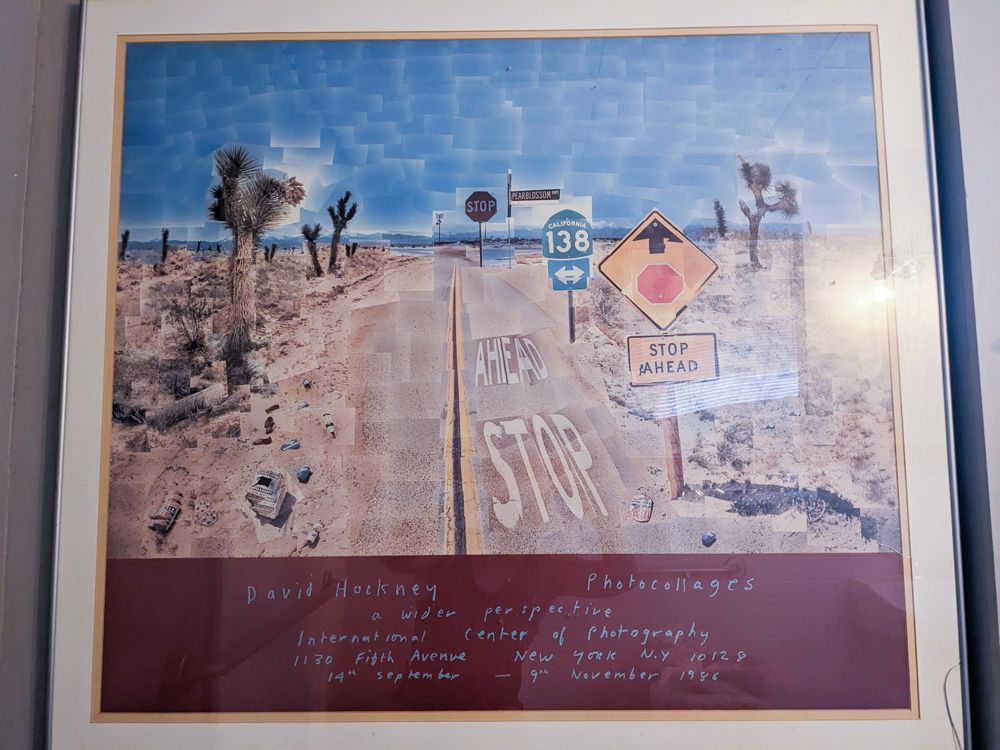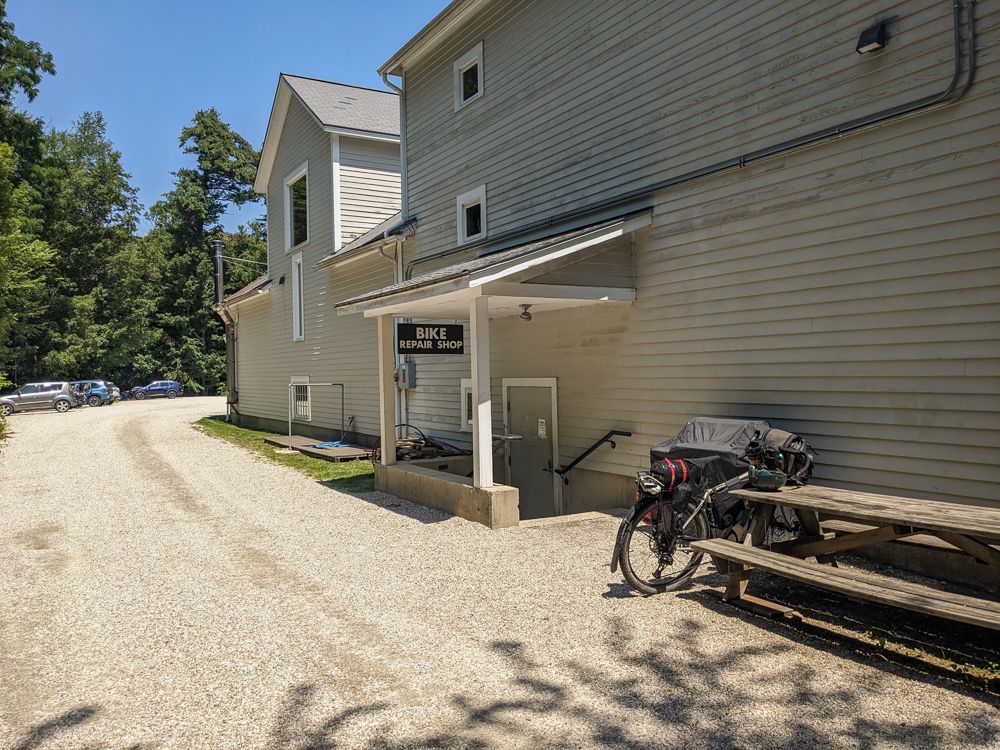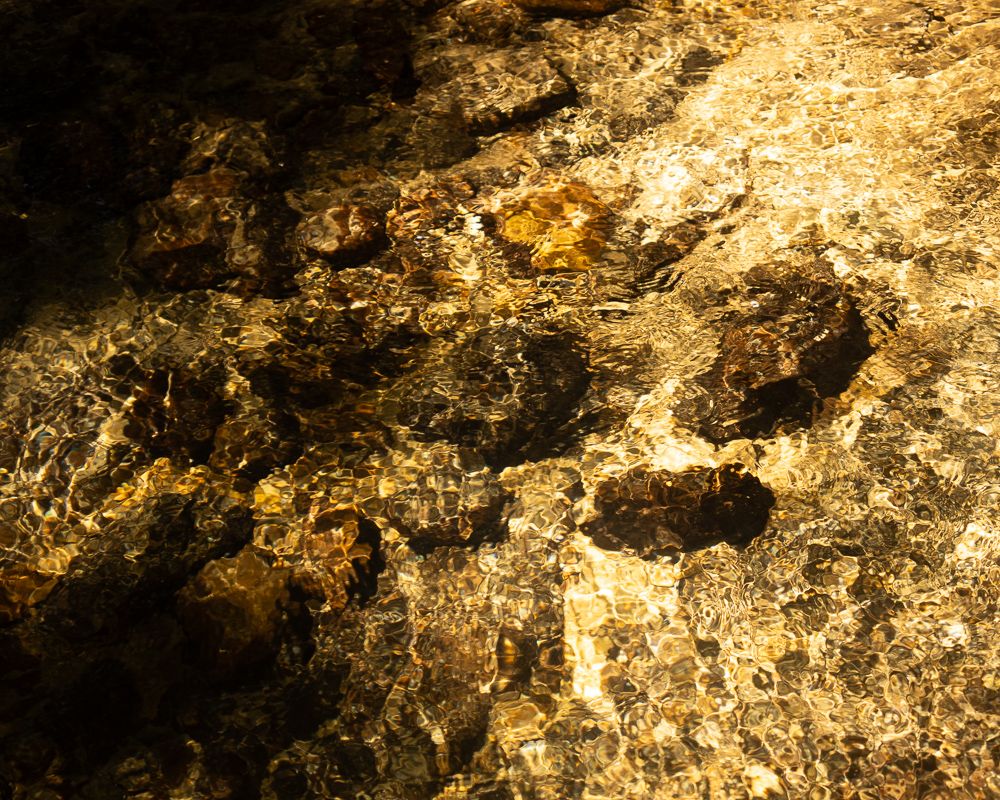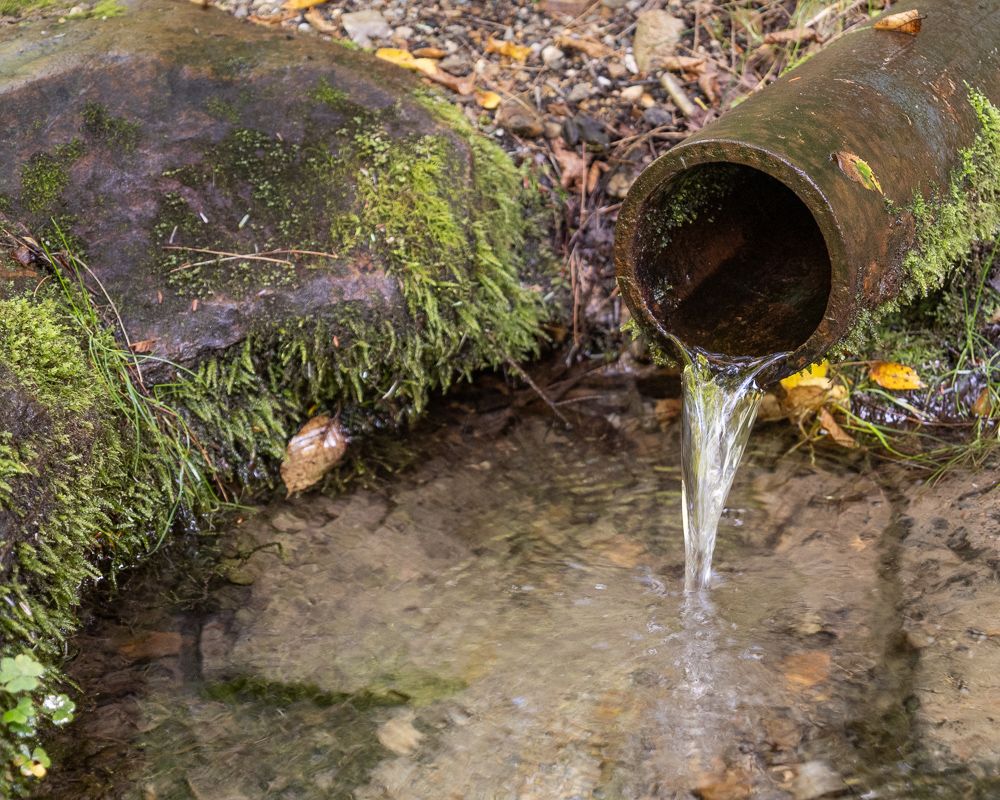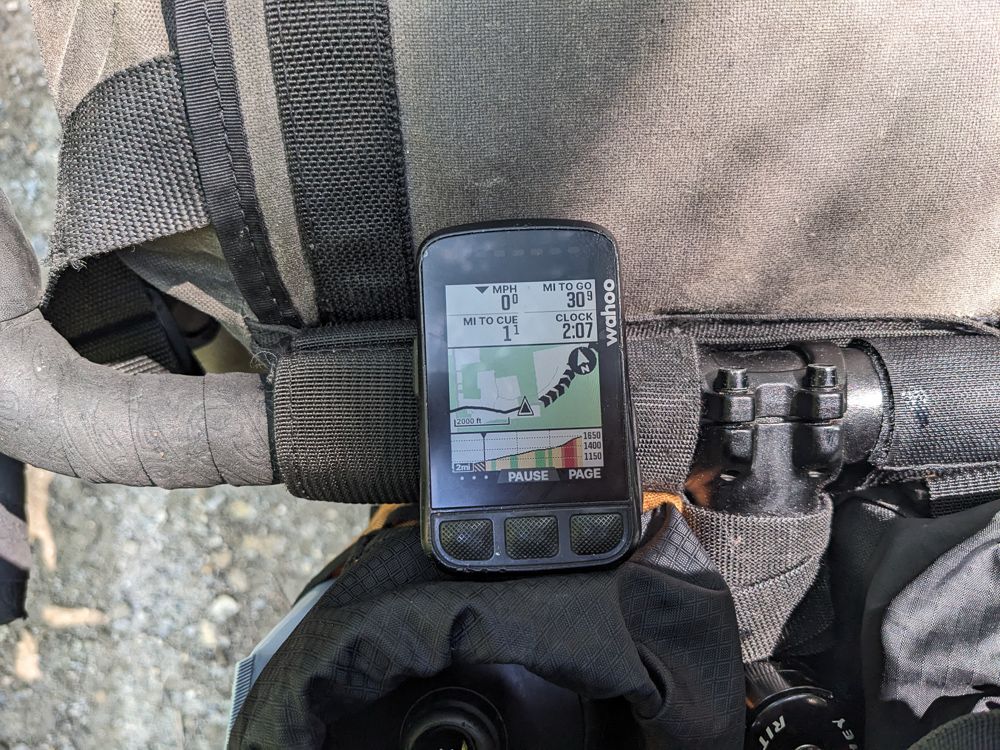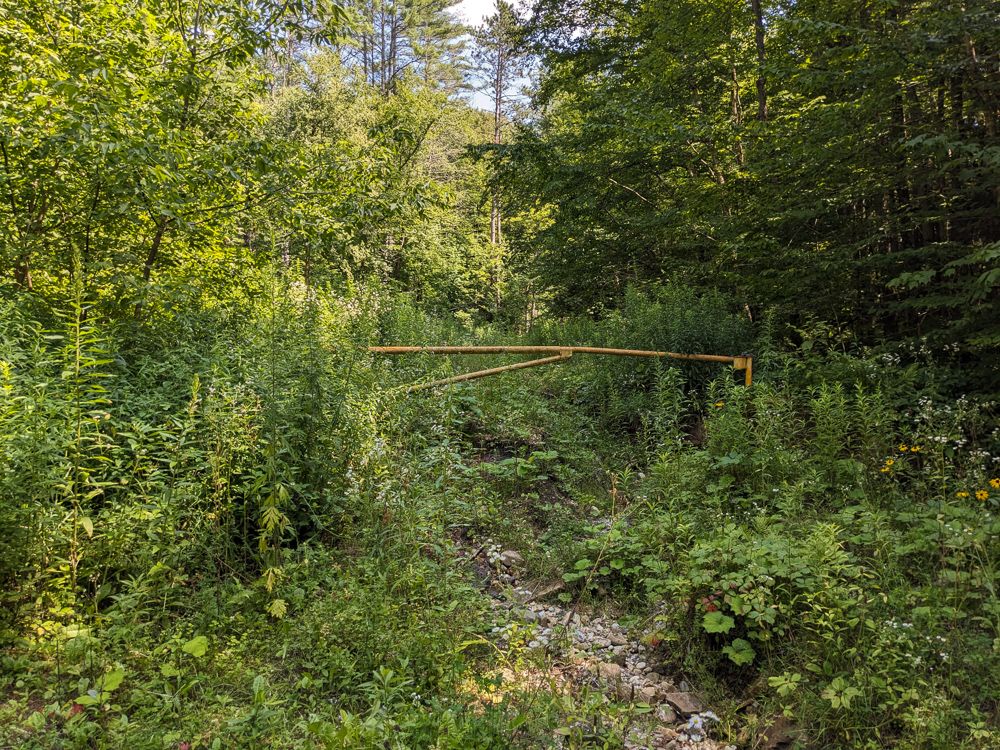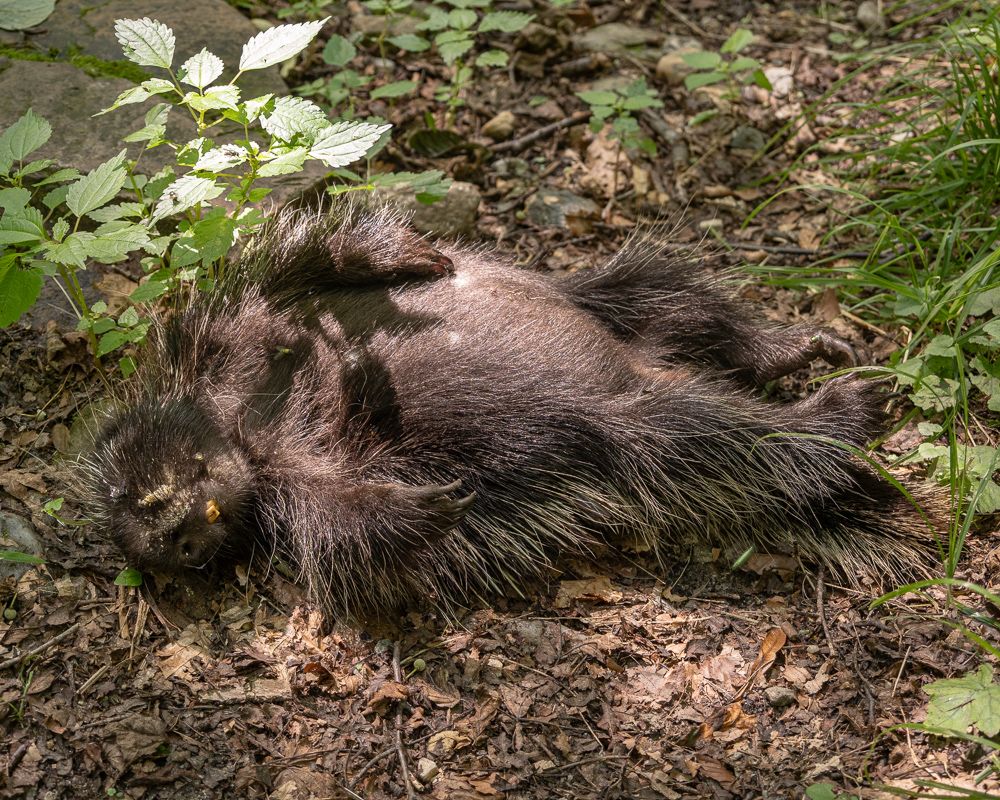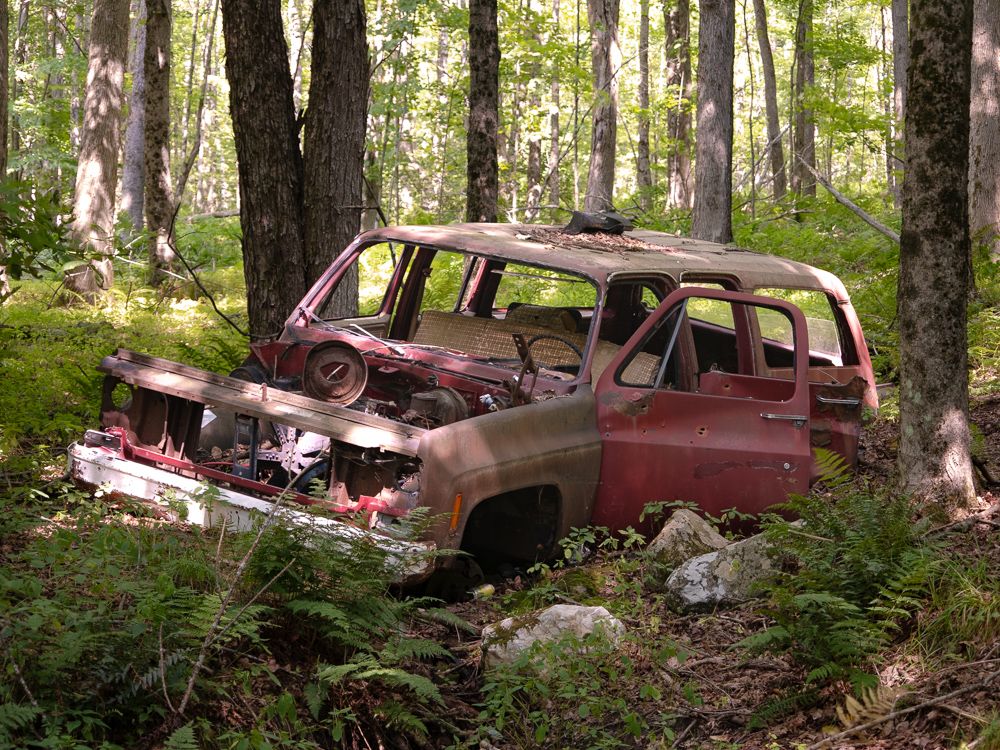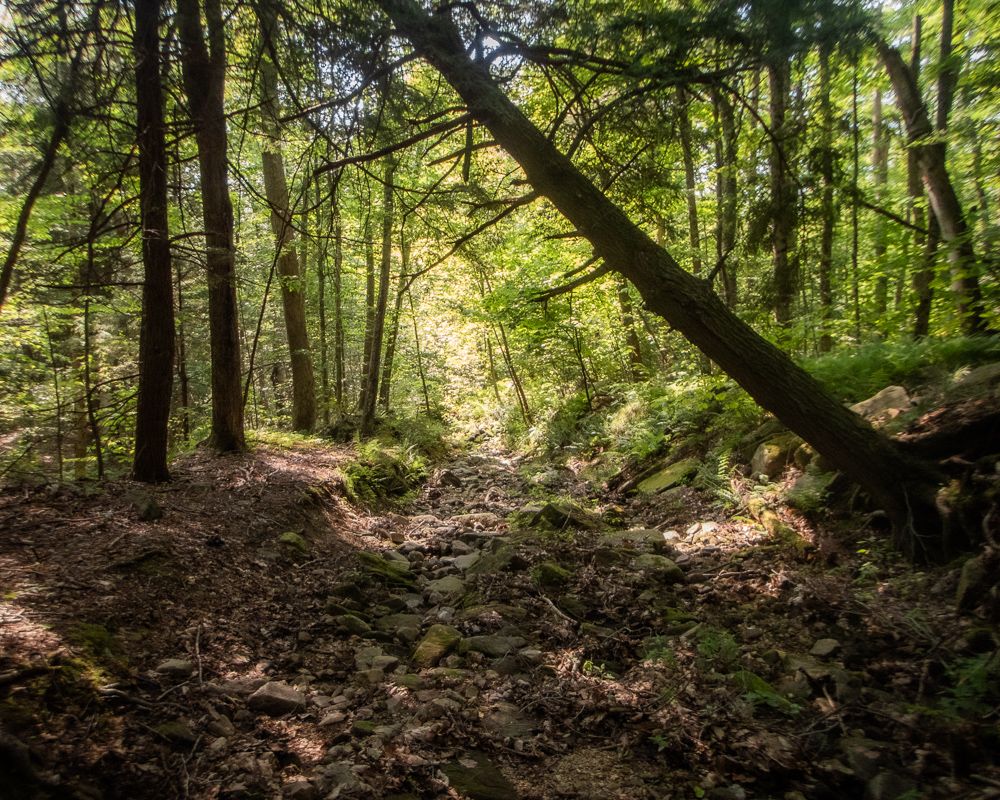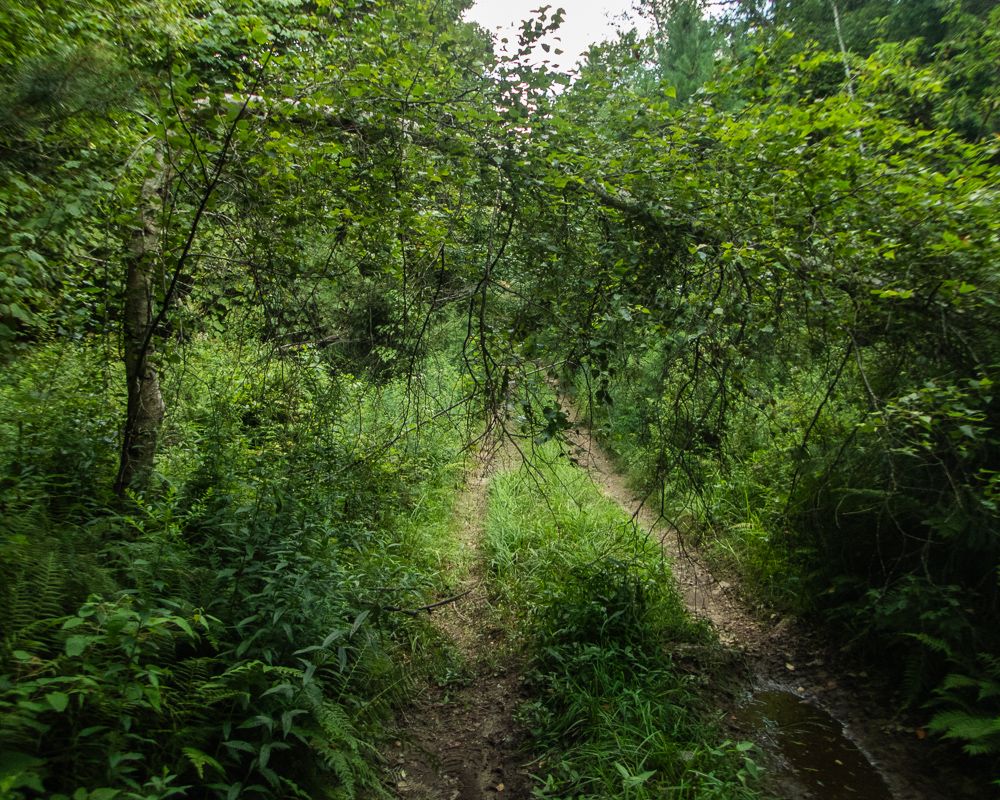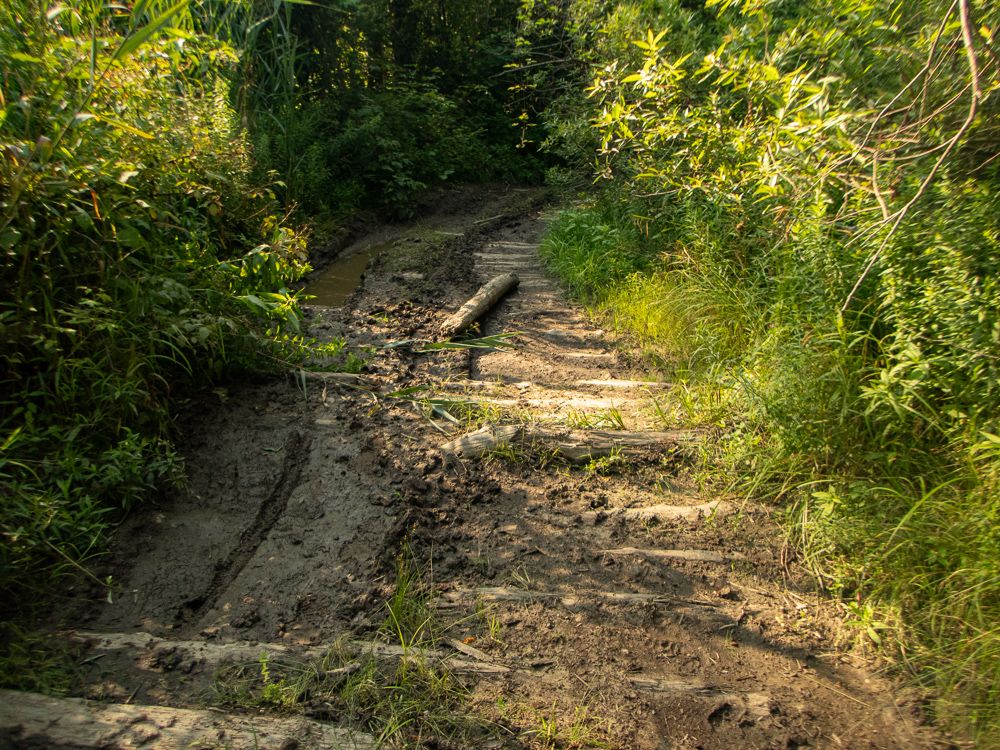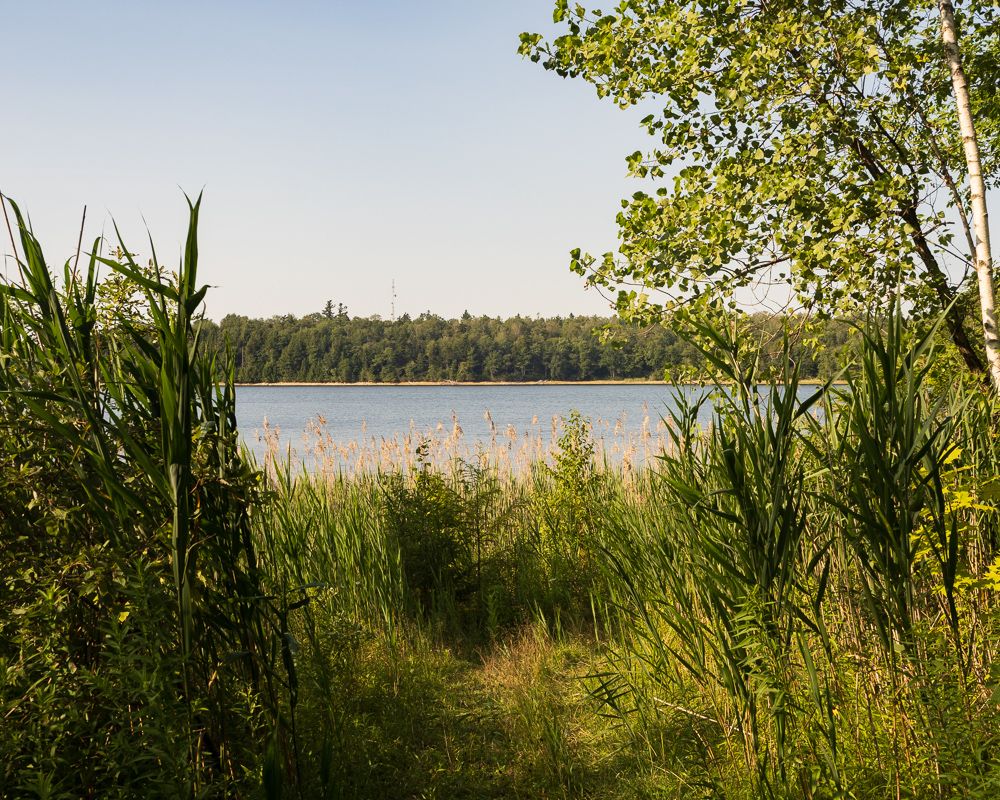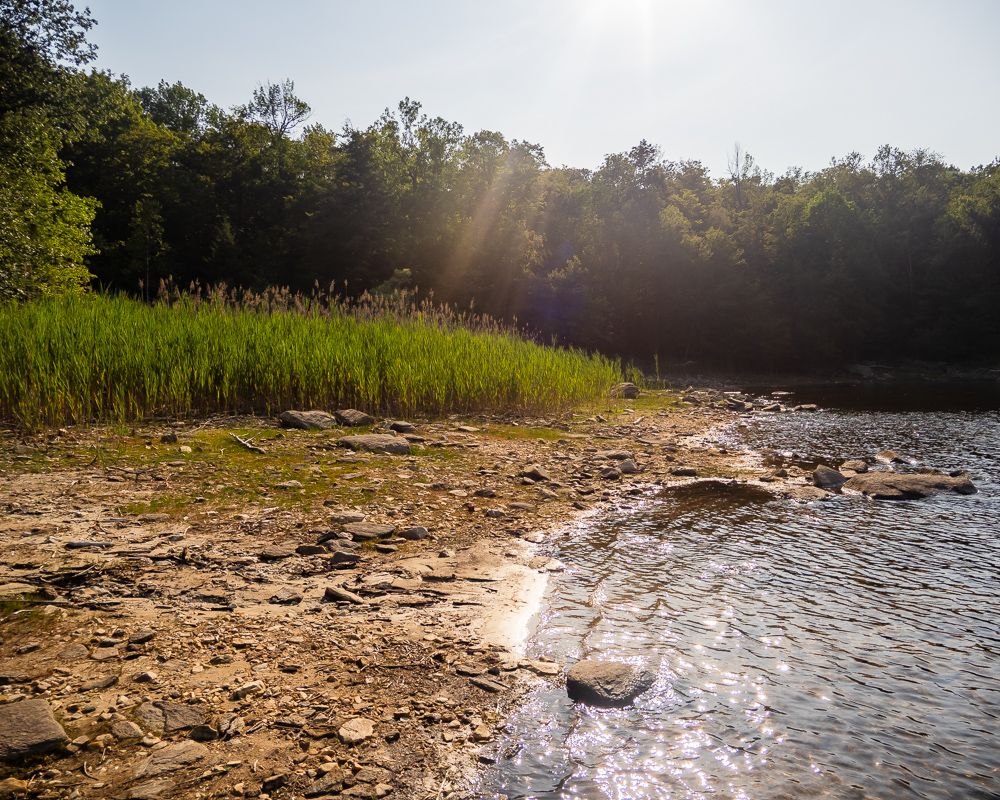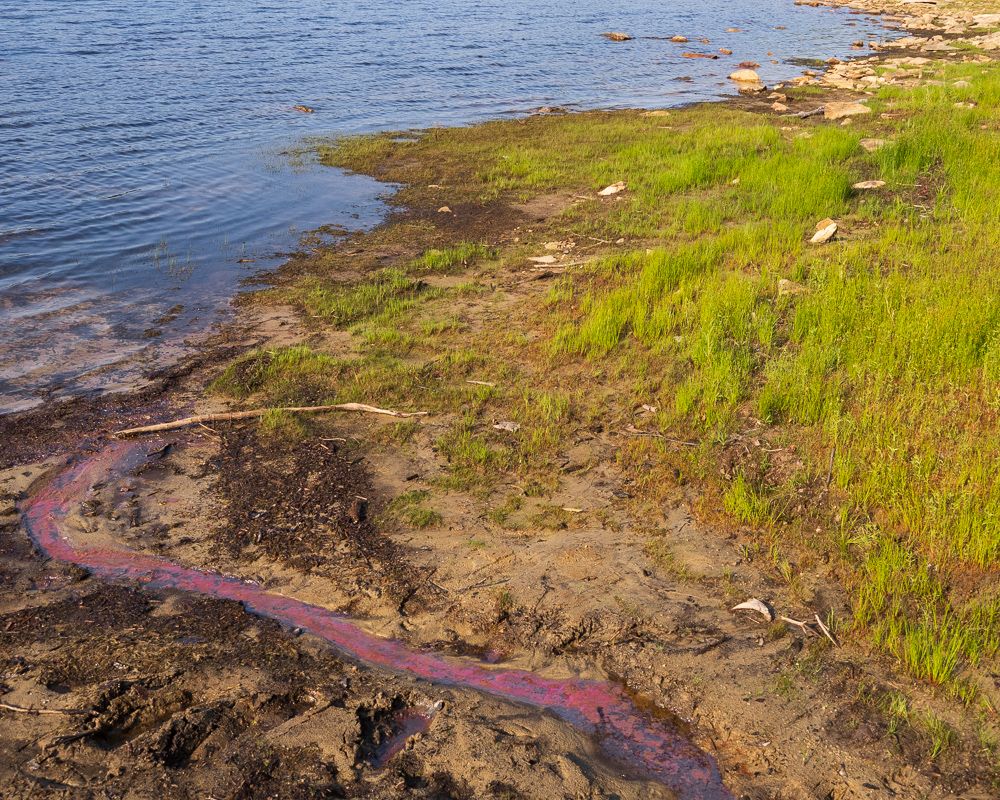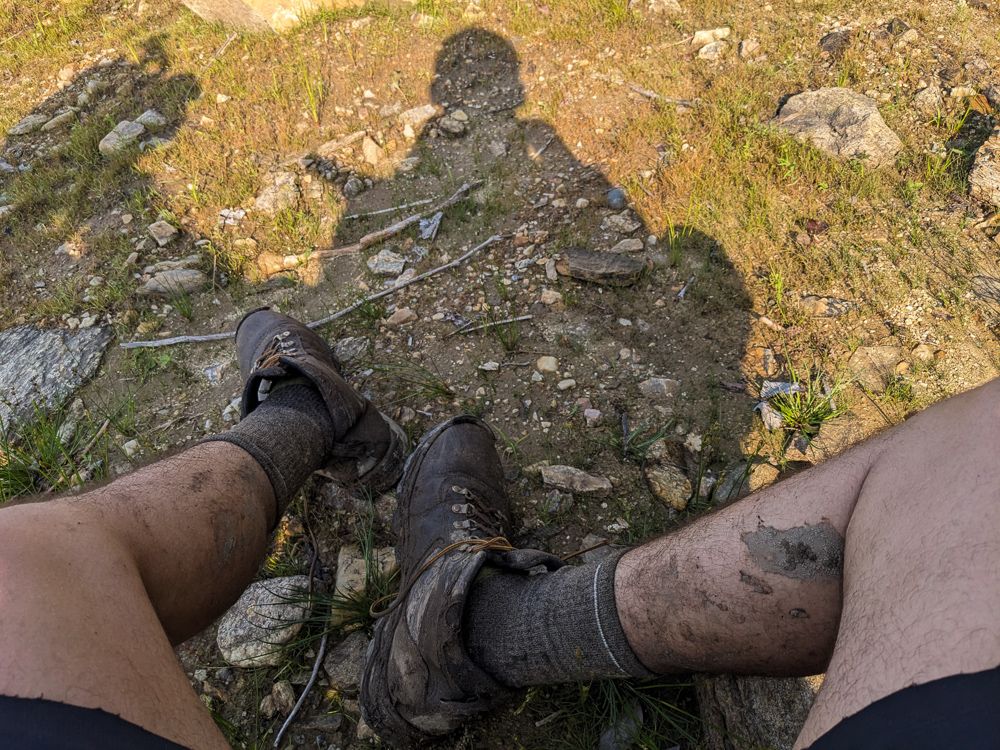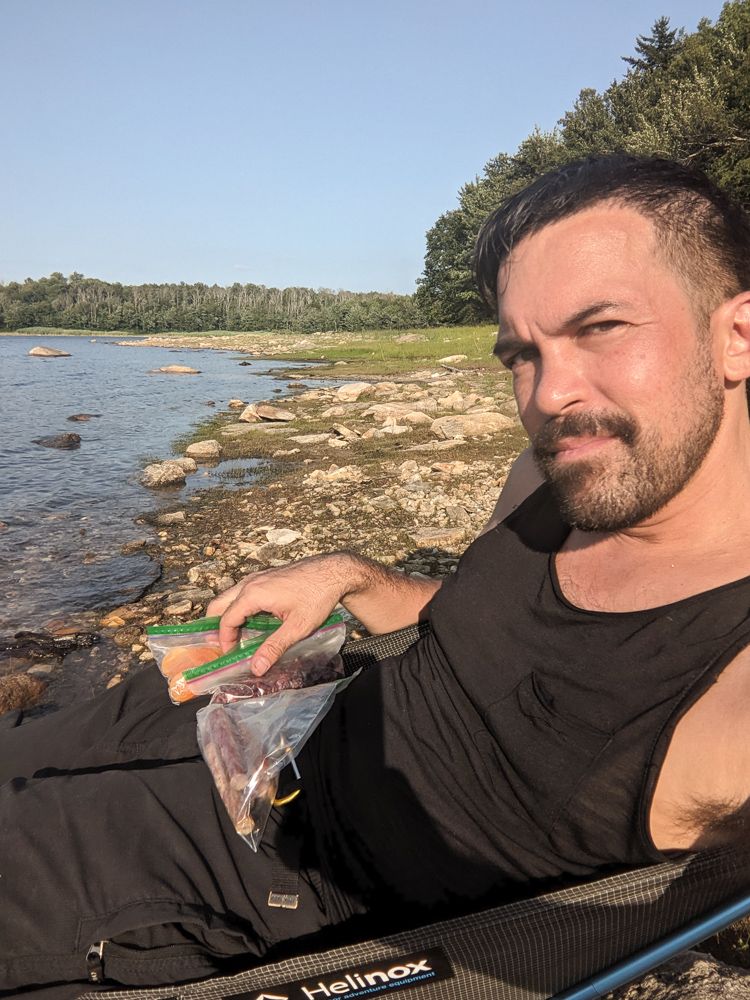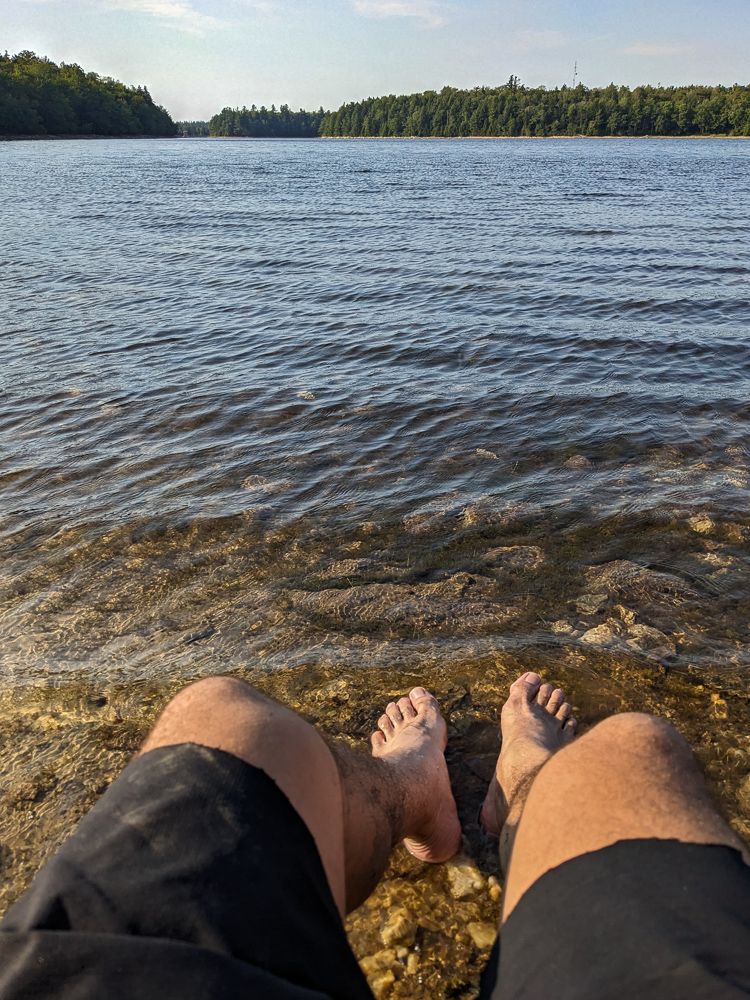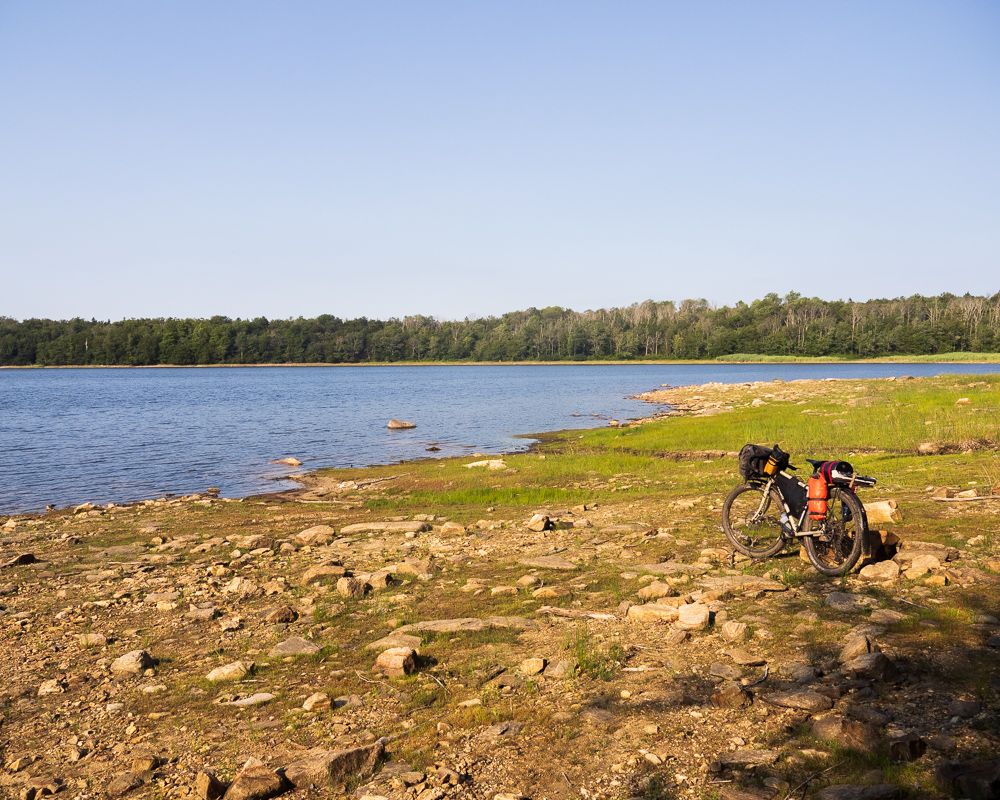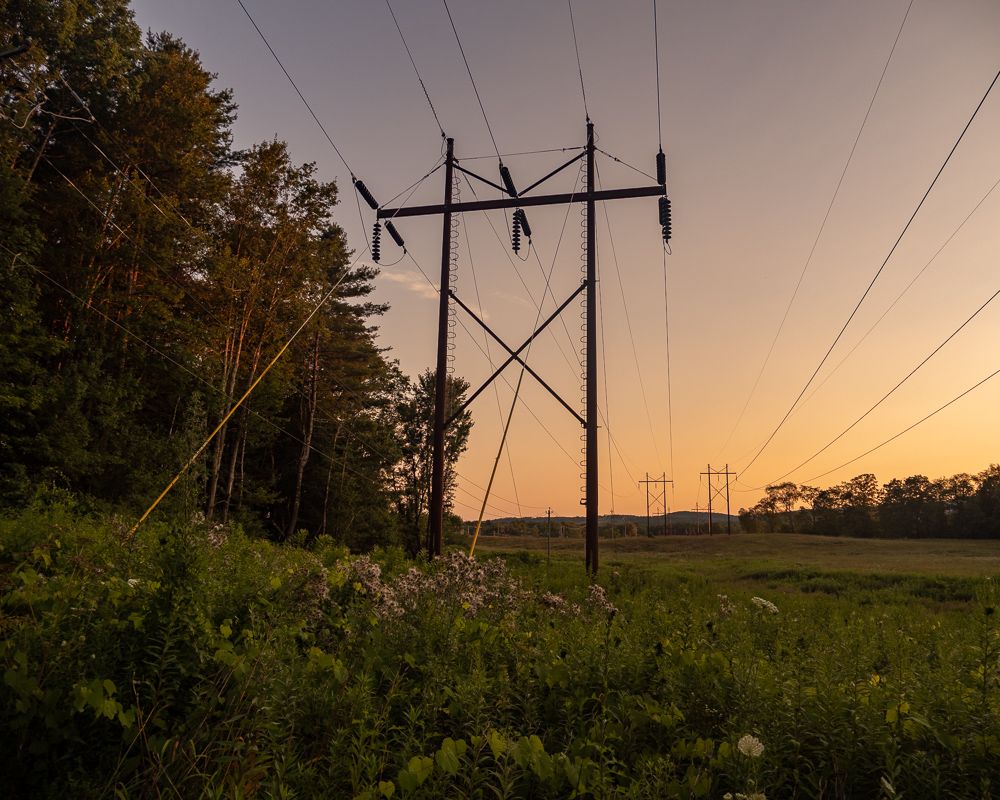Through the Green Mountains by Bike - Part 2_
9/10/2025 (jump to photos)
Contented river! In thy dreamy realm
The cloudy willow and the plumy elm:
Thou beautiful!
From ev’ry dreamy hill
what eye but wanders with thee at thy will,
Contented river!
And yet over-shy
To mask thy beauty from the eager eye;
Hast thou a thought to hide from field and town?
In some deep current of the sunlit brown
Ah! there’s a restive ripple,
And the swift red leaves
September’s firstlings faster drift;
Wouldst thou away, dear stream?
Come, whisper near!
I also of much resting have a fear:
Let me tomorrow thy companion be,
By fall and shallow to the adventurous sea!— Charles Ives, Three Places in New England: III. The Housatonic at Stockbridge
(excerpt of text by Robert Underwood Johnson)
Optimistic, but scared.
As I approach the lean-to, my anxiety alternates between the possibility of having to socialize with hikers and the possibility of being entirely alone in Beartown.
I'm the only one here.
A lean-to is most useful when it's very warm or rainy, conditions that make using a tent unpleasant.
This lean-to seems a bit grubby in spite of recent renewal. They always do. They're dark, imperfect boxes that trap soot, leaves, dust. They attract spiders, snakes, and rodents. The inevitable carved graffiti adds a dimension of existential gloom: the inscrutable scrawlings of dead people. A seemingly ironic broom and dust-pan. I suppose that I’m made of fussier stuff than the typical Appalachian through-hiker.
The main reason I find this particular lean-to unattractive is the volume of mosquitoes. I'm briefly amused to watch the repellent work, like a choosy, stink-eyed twink cruising the Ramble. The blood-thirsty insects hover disconcertingly close, tickling and buzzing in my ears, but they do not, for the most part, land on me or bite me. After a moment's reflection, I realize how unpleasant it would be to sleep with any part of my body exposed to them.
I choose the pad nearest to the lean-to and set up my tent. I've done this many times so the most remarkable thing about the process is how thoroughly I sort out anything that might attract critters, small or big. Food, food wrappers, toiletries.
I cannot remember having camped in a quieter place. Not only is there no highway close enough to generate the background hum typical to most tri-state camping spots, there are no sounds of birds, insects, frogs, water, or wind.
The sounds I do hear are the worst possible kind for sleeping: intermittent and clearly vertebrates of various sizes moving around in the forest. I am convinced that the more distant sounds of snapping sticks are bears. The quiet rustling sounds around my tent must be rodents of some sort. I am anxiously texting with my mom about all of this, assuring her (and myself) that although it's difficult, it's also fine fine fine. Critter jitters.
What sounds like a fox runs right up to my tent and sniffs around for a bit, apparently unfazed by my incoherent aggro-babble. At this point, I have taken to wearing my headlamp, turning it on and speaking in a confident tone whatever half-asleep words my brain can shovel into my mouth, in order to intimidate whatever creature has woken me up into leaving.
Later on, I wake up anxious about my handkerchief, which is saturated with a combination of sweat, various ointments, and very probably some dribbles of food. I get up and wander around the darkness in my flip-flops and headlamp, hoping to locate the bear box my research had promised. I fantasized that I would gather up all my smelly things, and dump them inside alongside my anxious insomnia. No such luck. I settled on draping it over a random bush.
The climax of this creepy forest night terror is a protracted crashing sound, reverberating strangely over-long against the silent, porous landscape. The next morning, I confirm that it was a tree (or large branch) falling a across the path I had hiked up.
By a combination of sheer exhaustion exacerbated by extended hypervigilance, I finally fall asleep until sunrise, having slept 4 or 5 hours. This is actually not an uncommon or unworkable amoun for me, as I am a very light sleeper and suffer from occasional insomnia.
None of my things were disturbed in the night. The bear canister, the stove and cook set, the bottle of Everclear, clothing, and random bits and bobs are, as far as I can tell, exactly where I left them. I am relieved that I will not have to search for things carried into the woods or swatted down the hill, which I have read is not uncommon in areas lousy with bears.
I make breakfast on a nearby stump. The process is like this: boil water for instant coffee (Starbucks Blonde if I can find it on sale, otherwise Folgers crystals, yuck) and then boil water for hot food. I realize that I didn't remember to pre-salt/sweeten my oat bran. Not the end of the world as the various fruit and nut snacks I mix into it are plenty sweet and salty.
The tiny Flex Tape patch I had put over the tiny hole in my (not tiny) silicone water bladder has fallen off and disappeared somewhere in my frame bag. After breakfast, I duplicate the repair with a larger piece. I notice a hole in the thin sandwich bag of oat bran, which has leaked out into the bear canister. I repair it with two pieces of duct tape (one inside and one outside, in some kind of symbolic attempt at food safety).
I've carried this particular length of duct tape for years as a part of my bike repair kit. It is moderately thrilling to be able to finally use it for something. It's a bit like when I open a tube of super glue. Everything that it can fix gets fixed forthwith, mainly because it is nearly impossible to keep an open tube of super glue viable for any length of time. But also because fixing things with tape and glue is fun.
Packed up and on my way out of the tenting area, I notice a sign screwed into a tree which indicates the locations of the bear box, privy, newer lean-to, and spring water. I feel kind of dumb for not having noticed it sooner.
I decide to check out the spring before heading back down the trail. It is dismal. It isn't flowing or bubbling in any way. It is a dark, stagnant puddle glorified by a small grotto of rocks, like a fossilized toilet. If I were desperate to use it, I would have to lay on my stomach to reach it, straining the water through a hanky to keep out leaves and other debris. It too is suffering from a case of Gloomy Lean-To Syndrome.
I descend the trail in happy collaboration with gravity, confident that I'd find nicer water elsewhere. I become briefly disoriented when the trail vanishes into shrubbery. It's the tree that fell the night before. Thankfully it was easy to get my bike over it.
Back on the grassy and occasionally rocky forest road. A few confidence-inspiring and techy climbs then smoother downhill surfaces. I'm keeping an ear out for the sound of running water, and an eye out for dips that might indicate stream crossings. Eventually I come to a bridge crossing over a stream in the obvious sunlight, foiling my water-sniffing pretensions.
Getting down to it requires a bit of effort, but I manage not to injure or otherwise scrape myself on the rough vegetation, rusty metal, or concrete retaining wall.
The sunlight is coming down hard and bright now and I'm sweating. I'm kind of proud of the fact that I can filter water at all (thanks to the successful Flex Tape fix), so I use my cell phone to capture the moment. It is not a good picture.
It occurs to me that I'm still trying to figure out what it is I might want to remember, what to share in images from this trip. The scene around me is pretty but not photogenic. The broad patches of green algae are more interesting if I frame them tightly. I chastise myself for trying to force aesthetic order where it might not be welcome.
I have to push the vessels of water ahead of me while clambering back up to the bridge. Hoisting myself up requires both hands. As I'm rearranging a few things on my bike, a man walks by with his dog. I'd see more of them later.
A bit further down the road, I decide that I can increase the pressure in my tires. I had deflated them a bit the day before in anticipation of the long gravelly climb to camp, and also to give my butt a break. Back in the shade, I apply the pump. Immediately, unexpectedly, and very quickly, the air begins to rush out of the tire unchecked.
The man and his dog walk by again. I say nothing in my embarrassment.
It's at this point I have only a merely hazy memory of the deeply flawed reasoning that kept me attempting, several times, with both tires, to use my obviously broken pump. I think it's because this had happened before, but I had been able to coax the pump back to life. No such luck this time. The tires are now nearly deflated but just rideable if I'm slow and careful.
As with my previously non-functioning water filter, I curse myself for not having checked it before leaving home. On the other hand, I'm actually somewhat looking forward to the challenge of getting myself out of this relatively minor (though extremely inconvenient) snafu. Things that could be worse: a broken leg; a fascist dictatorship; death? I want to get better at talking to people, being unafraid and unashamed when asking them for simple things that would help me out, and responding graciously (that is to say, without a gun) if they can't provide.
I'm able to catch up to the man and his dog, who are now in a truck and getting ready to pull out into the road. I sidle up as unthreateningly as possible and ask if he might have a bicycle pump. Generously, he gets out to check whether he might have one somewhere in the back. He does not. He tells me that he doesn't live far away, in South Lee, which is just outside the state park down the road in the direction I'm headed anyway. He said he'd leave it out the front of his house for me to use. I write down his name and address. This is good. Great, even. It helps that he's brown and easy on the eyes besides.
He pulls away and I begin my cautious descent down the rest of the mountain. My tires make a quietly disconcerting crunching sound as they gently crumple and uncrumple against the pavement. I avoid bumps and ruts as best I can, and keep my butt off the saddle as much as possible (my bike's geometry is not suited to extended periods of standing on the pedals). This is in an effort to avoid getting a snake-bite flat, the kind where the inner tube is punctured by the wheel rim bottoming out on it against the ground. It can also damage the rim. Another possibility is that the tires could roll off the rim, causing a sudden stop and crash, though that's only likely during hard cornering.
I'm giddy with patience, happy to practice slow-mo caution in light of the generosity I'd just been shown. Beartown is looking especially splendid this morning.
On my way down, I encounter another automobile paused at a fork, trying to figure out where to go. Some kind of snazzy European thing with an ostentatiously concave video panel claiming the entire width of the dashboard. Wanting to practice my newfound ability to ask for help, I thought I should also ask them. They seem nonplussed, maybe even slightly amused by the question. Unsurprisingly, they did not have one.
Further along, there's some construction activity in the narrow road. It's unclear what was happening, but I was able to go around easily, though with some trepidation: the equipment was large and intimidating and seemed to be precariously clinging to the hill.
The forest gives way to the first few houses, generously spaced but still on a suburban scale. A few mild uphills. Still a few miles to T's house.
A few hundred feet away from the promised pump, I turn a corner, continuing my slow roll. Which is just as well, because about fifty feet ahead, a black bear briefly pauses in the middle of the road to look at me before scampering off into the brush on the other side.
This is the first time I have seen a bear out in the world. It's thrilling. I wonder if the encounter would have been disastrously close if I had been going any faster. I have heard about mountain bikers being mauled to death after running into bears at full speed.
These stories inspire me to sing when I'm deep in the woods on trails with blind corners. It staves off feelings of isolation and prevents surprise animal encounters (or so I'm told). Usually Bowie, but I also like to improvise. Anybody who knows me well knows that I'm obsessed with David Bowie, improvisation, and "Grizzly Man". In fact, these three things would be near the top of a short list of essential facts about me.
I take a moment to absorb the experience, to let my pulse subside a bit. I'm at T’s house but I don't see a pump anywhere. His truck is parked out front, so I knock at the front door. His dog barks at me through the window. There's no response. I'm getting a bit anxious that I somehow misunderstood something. Looking around a bit more, I realize that he's laid the pump down and it was somewhat obscured by the grass in front of his garage. Next to it is a cold can of seltzer. Just as I'm realizing all of this, he emerges through the wooden gate to his back yard.
We drink and chat for a bit in the shade on his front lawn. I'm really glad to have somebody to talk to about the bear so soon, and about the tree that fell the night before. The dangerous, impressive stuff from my first day on the road. He's kind, gentle, perhaps a bit guarded, like most Americans (which I was recently told by a well-travelled friend). I don't learn much of anything about him besides what I can gather from inference. What kind of man lives alone in a house with his dog? Does he live alone? He has medium-long hair and he's not white. I am assuming he lives alone but I don't know why. There is a pervading sense of neatness. A Tuesday at home, puttering about. I can relate.
He leaves me to pump up my tires. It's a nice pump.
I bike a little way down the hill from his house and pause in the shade. I need to find a bike shop to get a new pump if I'm going to be tooling around in the deep woods later. There’s a place in Lenox that looks promising, other than the fact that it's at the top of a hill on a wide road. Guaranteed to be a hot, annoying ride as noon approaches.
An older, middle-aged couple is walking up the hill and we greet each other. It occurs to me that I can tell them about the bear so they can be alert and cautious. I don't remember exactly how I made it work. Maybe I did that awkward thing, where I respond at length to a casual "How's it going?" Their eyes widened in genuine interest, then the guy told me that he had only seen his first bear a few weeks ago. We chat for a bit longer about wildlife before continuing on toward Lenox.
Before climbing the big hill to the shop, I look for a place to stop for lunch. I am trying to proactively eat on this trip, to stay just ahead of my nutritional needs in order to avoid a “bonk”. (“Bonking” is basically when your body is completely out of energy and you can’t continue without a significant break.) This pleasurable optimization is easier to do alone than when traveling with companions, as it doesn't require coordinating desires about the timing or cuisine or cost.
Lenox is another tourist-y looking place, just south of the larger town of Pittsfield. It's also to the east of Tanglewood, the famous music venue. But I neither knew this at the time, nor would I have had the inclination to visit it on this trip. The only hint I got was when I used the bathroom at the bagel place I decided to patronize. Directly across from the commode was a large poster of David Hockney's photo collage landscape masterpiece, "Pearblossom Highway". And on the wall to the left was an artful isometric architectural drawing of the Tanglewood concert hall, printed in soft teal and pink.
The bagel place is staffed with summer job teenagers who went about their work with moderate indifference and mild acidity. I don’t begrudge them saving the effort of servile obsequiousness.
I order yet another bcnggnchz on an everything bagel, this time with a 250 calorie sweetened peach tea from the beverage fridge. The "added sugars" was 120% the USRDA. It is refreshing, if a bit over-sweet (I prefer my calories to be savory), but the quick energy would come in handy.
("Hummingbird food". A phrase I picked up from a college friend who spent one summer in the East Village loft-sitting for our diminutive French language professor who was away, as usual, presenting a paper on Baudelaire. In Rabat? She told me that all he had left in his small refrigerator were a few cans of Coca Cola and bits of cake and pastry.)
As I expected, the ride up the hill was on a steep, boring, sun-beaten highway. The kind that insults pedestrians and cyclists by having crossings only every mile or so. I frogger my way to the shop on the other side, pausing on the narrow median to wait for a gap in the uncoordinated traffic.
It's the kind of sporting goods store I had hoped I would find in Millerton the day before. It is approximately the size and shape of a millionaire's colonial style plantation house, but plain and contemporary, and with fewer (but larger) windows. It has impressive gardening which almost entirely obscured the ground level, including the actual entrance: the elevated front porch is definitely NOT the way in, despite announcing itself so prominently.
I park my bike against yet another employee picnic table. To the right was a line of repaired bicycles awaiting pickup; to the left was another door which is also not an entrance, in spite of the sign which reads "BIKE REPAIR SHOP". After circumnavigating the building, I somehow find my way in.
I am greeted by an older woman who completely embodied the no-nonsense New Englandy-ness I clock whenever I travel the region. (Perhaps this is exactly the energy I had picked up on in the bagel shop, but I had never encountered it from a teenager before.) She succinctly describes the way to the bike department. The place is sprawling in a fun sort of way that Jacques Tati might approve of, in spite of its airy, pine-panelled post-modernity. Although everything is tidy, one would almost certainly need a merchandise sherpa to find anything in it, since the building, and therefore the arrangement of its contents, seems to be mostly corners and alcoves.
Downstairs in the bike repair shop, a younger man is on mech duty behind the counter, spinning wheels and torquing bolts with his headphones in. The other one is closer to my age, but a bit older than me, with sandy hair and the handsome sun-worn look typical of a certain generation of mountain bikers, when mountain biking was spiritually closer to surfing. He shows me around the pumps, we talk about my continued preference for inner tubes, his friend admires my Ritchey. I probably yammer on about my inability to sleep. And the bear! He agrees to do a quick adjustment on my shifting, but finds that my chain is quite worn and that this is probably the actual cause of most of my (shifting) problems.
I purchase a pump. It feels pretty deluxe compared to my now-broken one. Without any prompting he tells me where the bathroom is, which catches me a bit off guard. Had I farted? Doubtful. Perhaps this is simply the supreme ultimate gesture of New England hospitality and pragmatism. Despite my previous bagel shop efforts, I did avail myself of the offer, once again receiving guidance from the clerk to an area just inside a small shoe storage area. There are no prints or posters of note.
When I return, we pore over a small map for a while and he gives me a little route guidance that will keep me off the horrible highway I had arrived on. I don't believe he was intimately familiar with October Mountain state park (which is enormous, the largest in Massachusetts), otherwise he almost certainly would have advised me of the challenging condition of the road I had planned to use to get through it.
Wrestled with my GPS unit for a bit as the shade behind the building disappeared, but who cares about that. Bluetooth, WiFi, blah blah blah.
It all started nicely. Some cute trails behind the store. A beautiful descent into the Housatonic river valley where the midday sun – which usually sharpens and flattens the visual field into an analytic schematic – made endearingly clear the beautiful variety of colors and textures that typically border slow-moving bodies of water.
A challenging paved climb followed. The thermometer in my GPS unit has always seemed a bit whimsical, but my sense memories agree with the spike of 100 degrees F recorded somewhere along this section. I stopped in roadside patches of shade to drink water and eat salt and sugar.
The pavement turned to a wide and smooth gravel road; the steep grade continued. At least I would now enjoy the modest cooling effect of the dirt and the adjacent Mill Brook. I stopped to admire its cool and clear flow, filtering water from it, splashing my face in it, soaking my magenta bandana in it, taking some heat-addled photos of dubious quality.
There was a brief reprieve from the climbing at the "top". But I was confronted with a confusing set of forks. Directly ahead was one of those large and hinged triangular metal gates you encounter on woods roads, which are intended only to keep out motor vehicles. But in this case, I couldn't imagine anything or anybody wanting to push through it. It was difficult to tell that it had ever been a road. All I could see was a chaotic spray of vegetation, an aggressive anti-garden whose flowers came at the cost of thorns, ticks, and tetanus.
It's just as well I paused long enough to work out that this wasn't the way I was meant to go. Looking at a map now, I see that it is marked as "Unverified DCR Track". It leads right up to the Farnham Reservoir's flood gate, from which the Mill Brook originates. In retrospect, it's possible that flooding from the reservoir might have been responsible for the rather extreme conditions along the road I would continue to travel.
To the left was a small wooden bridge. Just across it was another fork. The area seems to be recently bulldozed, with loose dirt and large tire tracks. I am passed by a motorbiker who takes the road to the left. I follow him briefly before realizing it isn’t at all remotely the direction of my planned route. I retreat back to the crossroad. Another lesson: pause and reflect whenever the route is in question. Pauseflect. Reflause.
Overcoming my initial doubt, I decided to investigate the road to the right. It’s a kind of switchback that does eventually lead back to New Lenox Road. This name became increasingly ironic. It seemed neither "new" and more like a steep stream bed of angry babyheads than a "road". Temps were solidly in the 90s; a welcoming committee of bugs enthusiastically greeted me.
They became so annoying that I actually briefly wore the head net Chris bought us on our first bike tour to Montreal in 2018. “Shall we don our chapeaux?” we would ask each other with mock haughtiness. We laughed at the novelty, the tight weave of black tool making us look like dollar-store bunraku puppeteers. I've taken it with me on all my own summer bikepacking trips since, as it's so light and small. As unpleasant as they are to wear, you never know when you’ll be chased by vindictive horseflies.
I came upon a dead porcupine and stopped to photograph it. It's just about the only wildlife photography I can manage: dead things that aren't moving. La nature morte. In his composition Indeterminacy, John Cage tells many amusing stories about mushrooms. There’s one where he finally decides to correct his mycology professor who had misidentified a deadly poisonous mushroom as a choice edible. When pressed about the mistake, he says “Well, I specialize in the jelly fungi; I just give the fleshy fungi a whirl.” Having made still photographs of still subjects for so long, such is my relationship to wildlife photography.
I always spend some time cautiously inspecting dead animals when I encounter them, but only if they aren't in an advanced state of decay. This porcupine must have died rather recently as it was still fully intact and was perhaps just starting to bloat. Flies were buzzing around it in moderate numbers. There was some sort of yellowish powder around the eyes, perhaps fungal, or some other decompositional process.
I only photograph fresh and intact animal corpses because they appear so much nearer to being alive, as though they might simply have fallen asleep in a slightly awkward position. Unlike something mangled and rotting, I can look at them at length and up close. Eventually, I am led to consider my own mortality.
This animal's death was recent; is mine therefore imminent?
This animal appears to have suffered no obvious distress; will my death be peaceful, quiet, alone?
Will the cause of my death be due to an absence: food, shelter, water?
Or an invisible presence: disease, poison?
Or both: the lack of treatment for a terminal illness, the result of a society that will not care for itself, no longer a society, but a jumbled federation of individuals at odds?
Although there are so many other ways to die (human ingenuity gives us new causes and cures every day) I find these the nearest and most compelling to my own experience.
Dwelling on these particular ways of dying might make it obvious that I have never had to kill, never have had to seriously contend with the violence of war, or of poverty, or racism. It becomes clearer why my greatest fear may be that the civil society I was raised in has only been a thin reverie of comfort. That the illusion, so-revealed, will, in my lifetime, be ripped apart by the debt of its own unresolved and unforgivable history. That I will not die physically but spiritually. That we will all die alone because we failed to come together to fix the only thing that ever mattered.
I have a strip of thinly-exposed film that has on it pictures I took of my father shortly after he died. Or rather, the shroud that covered him. I had neither the courage, curiosity, interest, or sense of entitlement to photograph his face in death. Maybe it’s because I was embarrassed I hadn't been there the moment he died.
Events moved quickly: from the moment my mother woke me up to tell me, anxious but perhaps not yet tearful; to when the hospice worker arrived to pronounce the time of death; to the time spent with the body before it was placed in a coffin and, with military ceremony, draped in a flag and transported away.
It was only during the brief moment after my mom had left his deathbed and before he was taken away that it seemed possible to take pictures. I recall asking her, explaining that, because it was on film, it would be very easy to never look at them unless we really wanted to.
The impulse seems so strange to me now. I am not Annie Leibovitz and he was not Susan Sontag. Were ambivalence and ambiguity my only motivations to take these pictures? Maybe this was the only way I could think of to confront his death. Through the viewfinder of an old film camera that may as well have been empty.
I still haven't looked at that film. It took me three years to even develop it and I'm pretty sure it's the last film I ever shot. I've left it uncut and laying out in my studio, hoping that maybe it might just slowly fade away into meaningless grains of noise, a kind of white elephant that somehow captures the thin and difficult relationship I had with my father.
It's one of the most remarkable features of film. It serves as a barrier between the act of taking a picture and seeing that picture after you've taken it. It's only an accidental, not inherent, quality of the medium. Obviously we have instant photos, elegant little self-contained chemical darkrooms that splurt out soft approximations of color and contrast. Conversely, we always have the choice to erase or destroy a digital memory card without ever having once looked at the viewscreen. Digital technology is merely the universal lubricant of post-modernity, releasing us from outdated moral frictions.
Still, the effort and expense required to produce a picture using a film camera is unparalleled, especially in a post-photomat world. I used to find this delay and tedium useful, and kind of aesthetic prevarication which prevented me from really having to decide why I bothered making pictures at all. Certainly not to make money, or to please anybody in particular. Certainly not to please myself.
Lately, I have decided that I am no longer attracted to the gauzy time-dialations between thought, action, and reflection that film imposes, or the physical preciousness of its materiality which inspires the "toxic impulse" of nostalgia and which pretends to make serious even the most inane images.
Maybe this is all just my long-winded way of saying that I'll be exclusively churning out AI-generated memento mori from now on.
The brook thins out to a shallow, rocky stream running down the middle of the road. I stop to filter more water. I am not peeing evidently because I am unable to drink water faster than I am leaching it out as sweat. However, I feel more or less fine, only a bit annoyed with the unrelentingly uncharming condition of my under-researched route. It will eventually end. All things must pass. Even shitty woods roads.
While filling a second bottle, I tip over the first larger one and most of the filtered water spills out as it rolls a way down the hill. Another little lesson learned: screw the cap on as soon as possible.
At this point the road becomes a bit vague but rideable and I find myself tootling up a path toward an ancient, decaying SUV. Stripped and speckled with bullet holes, as per usual for vehicles abandoned in the woods. I stop to take pictures.
Upon examining my GPS track following the trip, it appears that I was on a tiny side-path, unnamed and perhaps only existing because of this very spectacle. How such a tiny detail even ends up on a map is beyond my understanding.
Also following the trip, I used a popular chatbot to help me figure out its make and model. I have decided that it is probably a 1976 Chevrolet Suburban. Out of some weird, techno-optimist sensibility, I decided to tell the chatbot about my finding. It enthusiastically agreed. (They almost always agree, don't they?) It added, somewhat ominously, "The forest has stripped it down to the essentials, but those essentials match the Suburban." It is a rhetorical flourish as delightful as it is meaningless. But the accidental poetry bids me to reckless analysis.
To speak of the forest as having stripped the car annoys me simply because it is far more interesting and accurate to observe that people stripped the car. Even if you ascribed the vaguest notion of decay to forests specifically (and I see no compelling reason to as I can easily observe decay simply by opening my refrigerator), you would still be ignoring the human agency that abandoned the car in the first place. You would be ignoring how an abandoned car in a remote and uninhabited location is usually treated differently than a car anywhere else, again, by people. How, subsequently, people visiting the car took from it things they found useful; used it as shelter; used it as a garbage can; to fuck in; to shoot at.
What this pat, pithy statement fails to express is the notion that both forests and cars somehow encourage and contextualize certain kinds of violent, illicit, desecrating human activity. A vehicle abandoned in a forest is an especially potent locus of depravity.
It reminds me of Werner Herzog describing his ambivalent admiration of "the harmony of overwhelming and collective murder" of the jungle in The Burden of Dreams: that people who enter into it too deeply are marked by the curse of the forever unfinished violence of creation. Unlike in Fitzcarraldo – where a steamboat is successfully pulled over a hill so that an opera house might eventually be built there – Aguirre: The Wrath of God ends with what could be merely the hallucination of a shipwrecked galleon at the top of a tree along the Amazon river, the deluded and otherwise defeated conquistador Lope fantasizing that he will rule the New World in an incestuous, necrophilic dynasty.
David Lynch is less concerned with colonial delusions of grandeur, and more with whether the best and worst extremes of human behavior might be understood as spiritual in nature, the apparent intervention of external agents. In Twin Peaks, the moments of greatest violence or spiritual intensity are often set in the woods. For example, Laura Palmer’s murder takes place in an abandoned rail car in the woods. It’s important to note that these moments are just as often framed and foreshadowed by events in mundane, suburban settings.
I think this topic merits deeper, more careful exploration than I wish to attempt here. For example, the literary concept of the forest as a place where otherwise civilized people “go native” is often part of colonial or racist ideologies (Heart of Darkness, Lord of the Flies). To be clear, I do not think that these problems and complexities are lost on either Herzog or Lynch.
Alas, October Mountain was neither strong enough to kill nor curse me. At times I thought it had, or would.
At one point, the road turned into two rock-filled trenches separated by a ten-foot-high median of earth and small trees. I would guess this was the result of some huge flooding event. I left my bike behind to clamber to the top of the median to see whether either of the two sides or the median itself were more accommodating. Unclear. I continued to push and carry my bike along surfaces of varying degrees of shittiness.
Finally the hill flattened out somewhat and the road became rideable. Briefly.
Then the giant, all encompassing puddle-ponds started. No matter how wide or narrow the way, there was a puddle the perfect width of the road. A few times I could ride through, a few times I had to put my foot down, the muck and sluck inviting itself into my shoe. Most of the time I was lucky enough to be able to skirt around the edge. I’m embarrassed to admit that a few times, against Leave No Trace guidelines, I bushwacked a bit.
Where the puddles ended, the log-and-rock-infused mud began. This was also largely unrideable, for me, as the presence of large knobbly tire tracks indicated that this was a popular route for ATVs and the like. I'm sure a fully-squishy mountain bike or fresh legs could also have made short work of it.
When I finally reached the end, the way was blocked by an unaccompanied SUV, in much better condition than the deceased Suburban eight miles back. Obviously not abandoned. I cursed its owners for being so rude and resisted "accidentally" scratching it as I sidled by in the thicket.
It was probably around 5pm. I was exhausted and hungry. With 30 miles to the end of my planned riding for the day, I knew I was going to have to compromise.
I rode down the blessedly smooth gravel road leading out of the park, wondering if I'd be able to find a motel or restaurant or any civilized place to regroup. I noticed a large body of water through the trees to the left and thought how nice it would be to cool off next to it. I did a double take when I thought I spied a path leading toward it, and rode back to check it out.
I pushed through to some reeds and cattails, taking some pictures in the golden light. It felt that it might just be a dead end, a little vegetal grotto used to do all the little things that must not be seen. But I pushed on just a little way past a bend and it opened up onto a beautiful beach on what turned out to be Ashley Lake.
Oh boy. I took some self-congratulatory photos and decided that at the very least I'd sit down, soak my feet, wash away some mud, and finally cook that macaroni and cheese.
Massachusetts has no provisions for "wild camping" on public land. That is, there is to be no camping where it is not explicitly allowed. As far as I can tell, this limits the options to established campsites (the kind with flush toilets, hot showers, RV hookups) or the lean-tos along the Appalachian Trail.
Out of preference or out of necessity, but always self-consciously, "stealth camping" becomes a synthetic third option. Although it can be considered a subset of wild camping (you are camping above board, but simply wish to escape all attention), it is most often understood as sneakily camping where camping is not permitted.
In my present situation, I was deeply tempted to break the rules. I had deployed my folding chair next to the cool, limpid waters of the lake and took selfies in the golden hour light while I soaked my feet and ate snacks, mugging like a baller because I can only make those faces by squinting into the sun. I had survived an ordeal with panache, surely I deserved to enjoy this clandestine luxury.
As I excitedly texted everybody about how I just might do this, a few things spooked me.
First, the border of the beach where the vegetation began again smelled very strongly of urine. Of course I considered whether it was from animals (deer and moose and BEARS oh my!). But the footprints in the sand indicated regular human use and that at some point I'd probably have to interact with them.
Second, a single prop airplane flew directly overhead, quite low, then about 15 minutes later, flew back the other way. It seemed possible that park rangers might actually surveil popular stealth camping areas this way and that I might get a visit later in the evening if I stayed.
(If I haven’t yet made it clear, I prefer for my human interactions to be strictly opt-in.)
The macaroni and cheese was passable, if a bit gluey. As I ate, I called the October Mountain campsite and asked if it would be possible to stay there that night.
Rico had the requisite Massachusetts accent and was very helpful after I'd explained the situation to him. He said he'd be around until 9:30pm to check me in and then proceeded to give me extremely detailed directions to the campsite. I dutifully wrote them down. But then he said something like "You can also use your phone, but you might want to set it for a car instead of a bike". Presumably so that I wouldn't be sent down any more challenging ditches.
As I was so tired and rather brain dead, I opted to plug the address into Google Maps. It spat out a 14 mile route which looped around the northern terminus of the park. Fourteen miles isn't nothing, but at least it was paved and mostly downhill. I quickly packed up my things so that I might make it before the end of civil twilight.
The first leg was a quiet flat road stretching in a straight line for a number of miles. It reminded me a lot of cycling the long way around Brendan T. Byrne state forest in the New Jersey pine barrens.
Followed by a pretty thrilling mountain descent. My fatso tires are the limiting factor with respect to speed during extended downhills, due to their rolling and wind resistance. I also limit how fast I go because they are optimized for gravel and so do not have great traction on smooth pavement. They drift rather easily while cornering above 20 mph. I topped out at about 35 mph. With smoother, stickier tires, I wouldn't hesitate to go above 40.
Good thing I had those fatso, dirt-optimized tires, because the last half of the trip was along Roaring Brook Road, wide and mostly flat, but rocky, rutted and pock-marked. It ran along a beautifully twisty bit of the Housatonic river (which I had already crossed earlier that day). Although mostly in shadow at this point in the evening, its placid waters reflected the last rays of the sun and the glowing orange of the twilight sky that followed. Occasionally I biked through very thick clouds of gnats. I spied heavy industry on the other side and wondered. Serious power lines stretched from my side to the other.
When I am in a hurry and do not have time or resources to program my GPS unit, I'll pop in my headphones and use the voice guidance in Google Maps. For the most part, it allows me to maintain focus and speed while minimizing false turns.
I put on a podcast: Terry Gross interviewing Marc Maron, talking about the death of his partner, managing his depression, his career, winding down his very popular podcast. After a whole day alone, it was nice to listen to other people talking.
In spite of the great fun I was having plying the moderately technical but fast-rolling route, it seemed to stretch on and on with no sign of park infrastructure on either side. It became dark enough that I had to turn on my lights. I was worried that perhaps I had led myself astray and was incorrectly interpreting Google's directions. But the gravel finally gave way to tarmac and the campsite appeared after a few turns.
Illuminated by a few dingy streetlamps, the area was permeated by the 60-cycle hum of an unseen transformer. I had spiralled into this place like a particle caught in a cloud chamber. Accidental, unknowing, invisible, suddenly visible, decelerated from a particle to a person.
